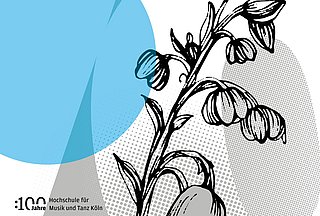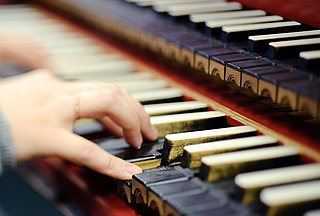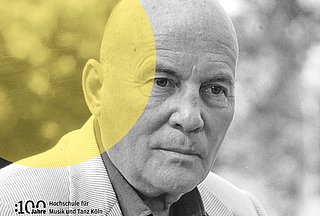Bachelor of Music -
Historical Instruments
Playing against oblivion.
With the Bachelor's degree courses in "Historical Instruments", we offer excellent training in the main subjects of recorder, harpsichord, lute and viola da gamba. In addition to individual instrumental and solo skills, we place particular emphasis on communicative music-making: Therefore, chamber music and ensemble lessons as well as professional stage practice are a firmly integrated part of the Historical Instruments course.
In addition, comprehensive knowledge in the fields of harmony and music theory is taught and promoted during the course. The wide-ranging curriculum guarantees a foundation that will enable students to face the demands of their careers in the best possible way. The Department of Historical Instruments is part of the Institute for Early Music in Cologne. Get to know the institute.
If you have any questions about the course, please get in touch with the relevant contact person.
Basic information
| Degree | Bachelor of Music |
|---|---|
| Period of study | 8 Semester |
| Course begin | Wintersemester |
| ECTS points | 240 ECTS |
| Major subjects | Blockflöte, Cembalo, Laute, Viola da Gamba |
| Continuing study options | Master of Music Historical instruments & baroque singin |
Additional information
The Bachelor's degree course in recorder, harpsichord, lute and viola da gamba lasts eight semesters and is divided into a foundation and main course of four semesters each. The 1.5-hour main subject lessons are supplemented by additional subjects - chamber music, music theory, music history, aural training, music pedagogy, choir and courses in the areas of bodywork and self-management - which help to complete the profile of a comprehensively educated musician.

Special features of the study
The respective artistic majors are staffed with an international team of professors and lecturers who have made a name for themselves as musicians worldwide. Due to their experience and pedagogical aptitude, it is guaranteed that the necessary prerequisites for the future professional field are imparted in the best possible way.
In the field of early music, the Cologne University of Music offers a range of courses that is optimally geared to the requirements of future professional musicians. The practical relevance to current concert life is guaranteed by the events and projects that take place regularly. These concert performances have become a prominent part of the cultural landscape of the state of North Rhine-Westphalia and are highly appreciated by the public.
Application and aptitude test
Applications are submitted online via the muvac platform. All information on the procedure can be found on our application page.
Admission requirements
- General university entrance qualification or a comparable university entrance qualification
- Proof of a TestDaF 3 language certificate for non-German-speaking applicants
- Successfully passed aptitude test
Qualifying examination
The aptitude test takes place in two parts.
- Artistic-practical examination in the main subject. Three stylistically different works from the 17th and 18th centuries are to be performed. (duration approx. 15 minutes)
- Music theory (approx. 90 minutes)
Detailed information can be found in the aptitude test regulations, especially in the appendix for content requirements and conduct of the test.
For the artistic courses of study, we recommend that you contact the main subject teacher of your choice in good time; they will be happy to advise you personally.
Course of studies and examination regulations
The program is divided into a basic study period (1st and 2nd year) with a high proportion of compulsory modules and a differentiated main study period (3rd and 4th year).
The structural framework is formed by 6 main modules and the profile-forming main module:
- Core module
- Artistic-practical context
- Education
- Mediation
- Professionalization
- Bachelor thesis / Interdisciplinary project
- Profile-forming module instrumentalist or instrumental pedagogy
Main compartments
Recorder
The Bachelor's program "Historical Instruments" with the artistic main subject recorder, taught by Prof. Kerstin de Witt, is characterized by an optimal symbiosis between artistic and pedagogical competence.
Harpsichord
In the bachelor program "Historical Instruments" Prof. Michael Borgstede teaches the artistic main subject harpsichord.
Lute
The artistic main subject lute is taught by Prof. David Bergmüller in the bachelor program "Historical Instruments".
Viola da Gamba
In the bachelor program "Historical Instruments" Prof. Robert Smith teaches the artistic main subject viola da gamba. In the course of the studies, a representative cross-section of the repertoire is developed, covering all styles and epochs.
Teachers
Barock Violine/Barock Viola
Barockgestik
Barockoboe
Barocktrompete
Cembalo
Cembalo, Generalbass
Fortepiano
Korrepetition Alte Musik
Laute
Traversflöte
Viola da Gamba/Barockvioloncello

Current events
Fronleichnamskirche der Ursulinen Köln

Kammermusiksaal Köln

Konzertsaal Köln

Contact

|
Leonard.Schelb@hfmt-koeln.de |
|
| Address |
Hochschule für Musik und Tanz Köln Unter Krahnenbäumen 87 50668 Köln |


